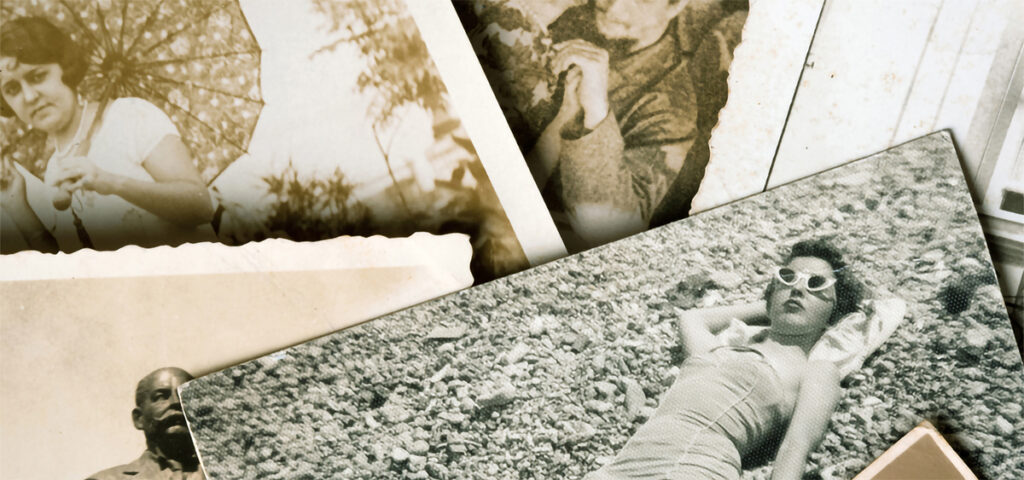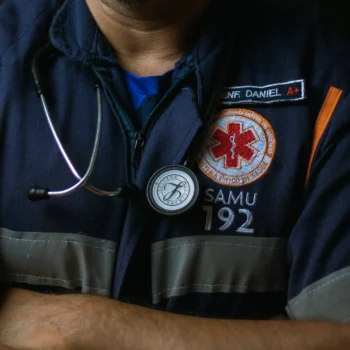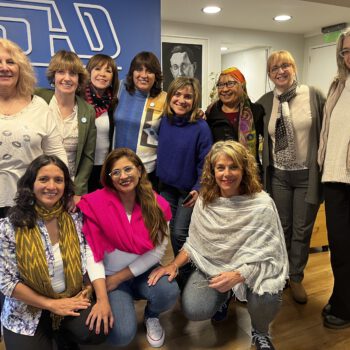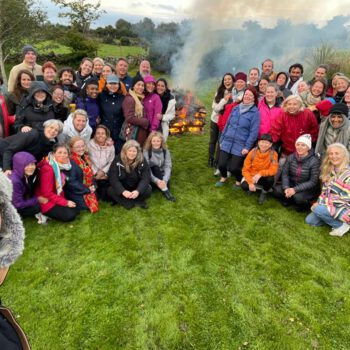A Compassionate Inquiry® Facilitator, Mentor, Circles Leader, Circles Steward and Portuguese Program Director, Soraya is also a Psychotherapist, trained in Internal Family Systems (IFS), Somatic Experiencing (SE), EMDR, Polyvagal Theory, Kundalini Yoga, mindfulness practices and psychedelic- assisted psychotherapy, which enables her to support clients during integration. The majority of her clients are seeking support with issues related to immigration.
This short edited excerpt of Soraya’s interview arcs from her first awareness of her ancestors’ presence to her immigration and work with multicultural clients. Listen to her full interview on The Gifts of Trauma.

Photo Credit
Some days I feel support coming through my ancestral lineage. I’ll feel their presence when I’m taking care of my needs, doing small, important things, like walking in the forest. I first experienced my ancestors when I was 14. I was in a car accident and it was a miracle that I survived. Just before the accident, I had a sense of someone (or something) telling me I’d be fine. And when it happened, I really felt that something was holding and protecting me. So today, I’m alive! I see Peter Levine do this exercise with clients going through complex trauma, veterans. I could have been dead and I’m alive. As I’m saying, “I’m alive!” My whole body resonates, “Yes, you’re alive.”
This experience of support before the collision completely changed my relationships with my ancestors, and spirituality. Afterwards, I became very quiet, introspective and I started having experiences I couldn’t understand. My family, especially my grandmother, were very spiritual. They helped me understand what was happening. Today, my ancestors are part of my daily life. I know for sure that I’m not alone.
As a BIPOC person born in Brazil, I bring both the teachings of my ancestors and my experience as a 20+ year immigrant to my work with clients. When I understand their ancestral history, I also understand them better. So when I talk about ancestors, it’s not just acknowledging their presence. It’s acknowledging the client’s presence, and the ancestral history they carry. That’s very important, because sometimes the focus of the session, or the elephant in the room, is the client’s ancestral history, and they may not be aware of its involvement.
I became an immigrant when my search for my true self inspired me to leave Brazil. I wasn’t happy living there and I was curious about how it would be to live abroad. I was trying to figure out my life on so many different fronts when suddenly the opportunity arose to come to Canada. Despite all of the paperwork and hoops I had to jump through, t didn’t take long before I was here. When you arrive in a land that is not your land… when you step out of the bubble of your country and language, you get to observe yourself with new clarity. My decision to come here was, in a way, pushing myself—or being pushed by something—towards my healing.
Being BIPOC in Canada is very interesting. If you really want to heal a trauma, like not being good enough, just move to another country where you’re BIPOC. I’m very proud to carry a Canadian passport, but being a BIPOC immigrant is quite challenging. Microaggressions happen everywhere. They’re very subtle and subliminal. Part of the challenge of microaggressions is their subtlety. If the experience was more obvious, more blatant, more clear, more in my face, it would be easier. Very painful, but easier. The subtlety led me to ask myself. “Is it just me? Is it my belief system? Is what I’m experiencing based on my trauma?” It can be so confusing.
Adapting to my new homeland took a lot of work every single day, and it’s been an incredible journey, healing so many aspects of myself, including my part that believed I wasn’t good enough.
My husband is a non BIPOC person. It’s as if I have two personas, one is a BIPOC female immigrant, the other is a BIPOC female immigrant with a white Canadian-born husband. My two personas each have a totally different nervous system, adapting for different situations, beliefs and interpretations. It’s not rational, but there are many things my system sees that others can’t see.
I work with a multicultural compassionate lens. It’s a phrase I posted on my website, and when I wrote it, I remember wondering what these words would mean for people visiting. I still don’t know what they think about them, but they are coming. Those of us who go through the Compassionate Inquiry® training get to experience what it’s like to be truly seen, heard and understood. So my multicultural compassionate lens may be the first opportunity my clients have had to be truly seen,heard and understood.
70% to 80% of my clients are immigrants based in Canada or other parts of the world. All of them are dealing with the many struggles that come with being an immigrant. It’s incredible how comfortable my system is when I work with someone who is sharing these struggles. There’s a big power imbalance in this field, but I meet my clients where they are, which levels the field. Also, the people I work with are often a lot like me. For example, I’m comfortable with their eating disorders, especially emotional eating, as this occured in my own family. So many clients talk about their emotional eating and how unhappy they are with their long term binging.
Only one word really describes everything my clients present, it’s trauma. My eating habits are based on my trauma—and—my eating habits are supporting me. They’re helping me navigate life by keeping my emotions at bay. They mask what’s really happening inside me. I just finished a Compassionate Inquiry® (CI) emotional eating circle, that uses the CI tools in emotional eating. Those who participated all shared the same sorts of functional/dysfunctional dynamics, rooted in trauma and dysregulation.
Studies have shown that people eat emotionally because their nervous systems are dysregulated, and they find regulation in food. Other people find that regulation in alcohol, and other substances, or other behaviors. And for sure, we live in a very dysregulated society. When I’m driving here in Vancouver, I can see how dysregulated people are. They get really frustrated and I can see the rage. When our system is dysregulated, we try to find external things to regulate our system and food is easy to access and readily available. So yes, many of us definitely use to food to regulate ourselves. But while they support me, they also keep my emotions at bay and mask what’s really happening inside me. So at best, they’re a temporary fix that usually leads to self-criticism and -judgment.
The Gifts of Trauma is a weekly podcast that features personal stories of trauma, transformation, healing, and the gifts revealed on the path to authenticity. Listen to the interview, and if you like it, please subscribe, leave a rating or review, and share it with others in your community.



